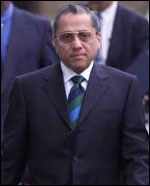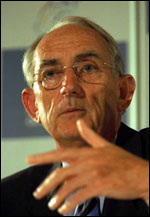No winners in stand-off
Daniel Laidlaw
The clock is ticking down towards a confrontation within the game and a
resolution to the match referee crisis has to take place soon or the farce
perpetuated in Centurion will continue into another series.
 It is difficult to know exactly where this controversy is heading and what
impact it will ultimately have on world cricket -- Jagmohan Dalmiya seems to
have backed away from subversive comments and ICC chief executive Malcolm
Speed has outlined the body’s position towards the problem -- but it is still
paramount that, along with a swift resolution, the true objectives are kept
in mind.
It is difficult to know exactly where this controversy is heading and what
impact it will ultimately have on world cricket -- Jagmohan Dalmiya seems to
have backed away from subversive comments and ICC chief executive Malcolm
Speed has outlined the body’s position towards the problem -- but it is still
paramount that, along with a swift resolution, the true objectives are kept
in mind.
Those objectives should be an open and honest discussion of the real or
perceived bias against India and other Asian teams, why it is so strongly
felt, and what can be done about it. After all, that was the real cause for
India refusing to play under Denness which then led to what was to be the
third Test being declared unofficial.
At present, the official face of the conflict seems to revolve around the
effect -- the international match between South Africa and India being
sanctioned as a Test, and whether or not it counts towards Sehwag’s
suspension -- rather than the cause. While that is important, it is still a
secondary issue.
Until there is official acknowledgement of India’s reasons for protesting
against Denness, and until the BCCI enunciates them, the dispute will only
go into remission. If that happens, the ill feeling will be kept just below
the surface, and it will be a question of whether it can remain there until
next April when the elite panel of umpires and referees is instituted. That
should entail a review of the performances of match referees which leads to
greater accountability, and a uniform appeals process for players punished.
The present lack of a right to appeal is clearly mistaken, for it presumes a
match referee cannot make a mistake. Even if he does make a mistake, it is
presumed that it is one of a small enough proportion that it will be
acceptable. It does not take into account the possibility of a referee
enforcing sentences so hypocritical as to be totally unacceptable to one
team. Why the member nations did not foresee the eventuality of the need for
appeal, and not already agreed to recourse to do so, is baffling.
For now, until the larger issue is dealt with, the status of the India-South
Africa match and Sehwag’s suspension has to be solved. Unless there is to be
a potentially damaging showdown and another series affected, there can only
be one outcome. The match has to remain unofficial and Sehwag has to serve
his suspension in the first Test against England.
First of all, India acted appropriately by refusing to participate in a Test
with Denness as referee. It is especially true since the prevailing attitude
appeared to be that by playing the Test, India would have shown it had come
to its senses and recognised it had acted rashly. This would have been
unacceptable given the lack of understanding of the motives behind the
protest, so the BCCI had no choice but to act as it did. But equally so, the
ICC had no option but to back its appointed official. The Test, in turn, had
to be sacrificed.
The fact that captains Shaun Pollock, by his own admission, and Sourav
Ganguly, by his own omission, did not take the game as seriously as they
could have is statement enough about its status. It would be unfair to the
players to retrospectively declare official a match they were told did not
count. Given the lacklustre way it was contested, its integrity as a Test
would be forever tainted.
But whatever the match’s eventual status, the ICC has to reserve the right
to make instantaneous decisions in times of emergency. It is essential that
the sport’s governing body has the authority to act swiftly to enforce its
existing protocol. Its inability to be firm and decisive in the face of
controversy on previous occasions was one of the reasons it was viewed with
such scorn as a toothless organisation.
 The ICC, in the form of chairman Malcolm Gray and chief executive Malcolm
Speed, had to support its appointed match referee. Just as the BCCI had to
act radically to be taken seriously, the ICC had to act as it did to
preserve its own integrity.
The ICC, in the form of chairman Malcolm Gray and chief executive Malcolm
Speed, had to support its appointed match referee. Just as the BCCI had to
act radically to be taken seriously, the ICC had to act as it did to
preserve its own integrity.
The ICC is judged by how it acts in times of crisis and despite Gray’s
ignorant and inconsiderate approach, if it was to retain any respect or
future authority, it had maintain its policy in the interim until the issue
could be debated in the appropriate forum. Otherwise, what kind of precedent
would it have set? This particular match refereeing decision was unfair and
deserved some form of challenge, but the next one may not be. That will
change for the better when an appeals panel is formed, but for now national
boards cannot subvert the governing body whenever they feel compelled to do
so, at least not immediately. Change can be forced, as it may well be in
this instance when the ICC next meets, but not capriciously when emotions
are running high.
The immediate establishment of a review panel, as opposed to overturning
Denness’s punishments arbitrarily in the manner of Dalmiya’s reprieve of
Shoaib Akhtar when he was ICC head, would only have been a gentler way of
admitting the ICC could be pressurised.
India has already made its point by refusing to play under Denness. The fact
that the match was unofficial should not affect that. Dalmiya and the BCCI
now have their starting point to call for an elimination of double
standards, which should have been the purpose of the protest in the first
place. It should have been designed to make the world take notice and
consider the matter of discriminatory decisions seriously, which they now
have an opportunity to achieve. To become sidetracked about the status of
the match and Sehwag’s suspension would be folly.
That is the concession Dalmiya has to make. Then it would be up to the ICC
to respond by actually listening to India about its concerns and those of
other countries, if they have any. This is not the time for reticence. If
there are grievances, then now is the time to make them known in an honest
and constructive fashion, before a more professional system is adopted. The
other member countries must listen to those grievances and make an attempt
to understand them. Then, with five professional referees and an appeals
board from next year, hopefully this contentious issue can be overcome.
The Mike Denness controversy
More Columns
Mail Daniel Laidlaw